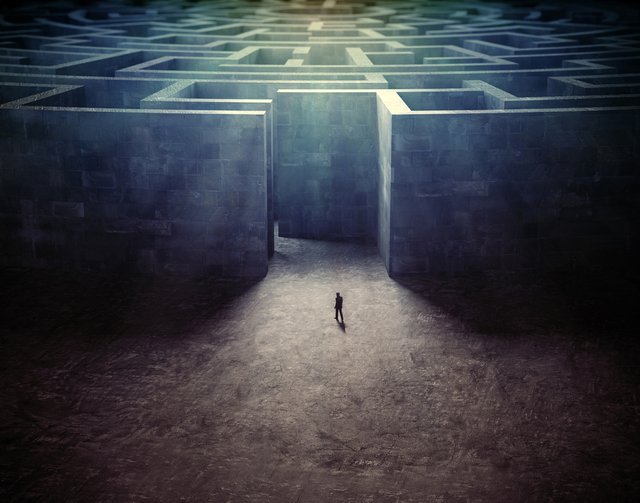How to Interpret Your Own Dreams
Everyone dreams. While you are sleeping, your brain is busy working to produce images, sounds, feelings and ideas. Some people remember more dreams than others, but everyone who remembers a dream wants to know "What does this mean?" To answer this question, you don't need to go to an expert or consult a list of symbols; you simply need to learn some basic principles.

Dreams have been puzzled over for centuries. In Homer's Odyssey, Penelope has a dream of an eagle, interpreted as the return of her husband. In the Bible, the story of Joseph in the book of Genesis revolves around his dreams and his ability to interpret the dreams of others. The Bible suggests that God speaks through dreams and only God gives the power to interpret them. Greek thinkers such as Plato rejected the idea that dreams came from the gods, preferring the theory that while the body slept, the mind stayed awake. Herodotus, the Ancient Greek historian, said that dreams simply reflected the waking concerns of the dreamer.
But when dreams can seem so outlandish and illogical, how do they reflect your everyday concerns? Freud, who called dreams "the royal road to the unconscious", believed that your mind is constantly dealing with thoughts, worries and ideas of which you're never consciously aware. These forbidden and suppressed ideas make their way out in dreams when the conscious mind is sleeping and can't control them. Dreams aren't the voice of God, they are the voice of your unconscious mind, and the task of the analyst is to help interpret them.
But does dream interpretation really need a special gift from the gods or years of training as a psychoanalyst? Why can't you just interpret your own dreams? This wish to understand what happens in your own mind has resulted in hundreds, if not thousands, of dream dictionaries. Have you had a dream about flying? Ask the dream dictionary what a flying dream means. Did you dream about being chased, or falling, or losing teeth? Check the dream dictionary! The problem with dream dictionaries is that they give an explanation of dreams in general, but not of your specific experience. They explain a dream, but not your dream. They work in much the same way as newspaper horoscopes. Whether or not you believe in astrology, two sentences in a newspaper column can't possibly apply to every reader born during a given month. But they will be applicable to enough readers; the horoscope makes sense. So dream dictionaries make sense of dreams because their interpretations are broadly applicable.

The best way to understand your own dreams isn't to look up each element in a dream dictionary. It's to know how information is presented in dreams so that you can decode it yourself.
Firstly, and most importantly, whatever you remember about your dream isn't accurate. As soon as your conscious mind begins to process the dream, it changes. You've experienced this if you've ever tried to tell another person about your dream. What seemed like a coherent narrative suddenly seems to be a series of disjointed moments, and pretty soon what you remember is what you said aloud, and the original dream has vanished forever.
Secondly, dreams do include symbols, but not always in the way they are presented in dream dictionaries. In many cases, a symbol in a dream is a simple visual reference: a worry about the health of your bowels might result in a dream about a blocked drain. And symbols aren't only visual. Dreams often involve puns, or similar sounding words. A person who is worried about making a "right" decision may dream about a maze where they are compelled to turn right.
Thirdly, dreams are more often about feelings than events. Many dreams take place in familiar surroundings or feature people known to the dreamer in an unfamiliar setting. In most cases, the dream is about neither the place nor the person, but about the feelings associated with that person and place. This is the reason that dream dictionaries aren't always useful. If you dream about your cousin, a list of symbols can't possibly know how you feel about that person, and that's what's important in understanding the dream.

Finally, the dream is about you. There are oft-quoted examples of "prophetic" dreams, where a future event is revealed, but these are few and far between, and may involve the dream being interpreted in hindsight. For the purposes of interpreting your own dreams, it's best to assume that whatever happens in the dream is what's happening in your own mind. If you dream about your cousin, the dream is about the part of you that loves or hates or is most similar to that person, and not actually about your cousin at all.
How can you use these principles to understand your dreams? The first step is to keep a record of your dream. You can write down what you remember, or record yourself talking about it. Although most smartphones have the facility to record your voice, by the time you've unlocked your phone and navigated through the menu, your conscious mind will have censored most of the dream. An old-fashioned dictaphone works best, where you simply have to hold down the "record" button and speak. Say whatever you can remember about your dream. Include as much detail as you can, particularly about your feelings.
Once you've got your dream on record, identify any themes. In the dream, are you looking for something? Being forced to go somewhere? Do you feel free, or apprehensive, or joyful? Do those ideas or feelings appear in your everyday life, or are they very different from your normal experience? Think about places or objects in the dream. What do they remind you of? What do they look like, or sound like if you say them aloud? For example, if you've started a new job, and your boss is Ms. White, a dream where you're struggling up a mountain and you feel you've got to get to the white snow at the top will make a lot of sense. In this instance consulting a dream dictionary for the meaning of mountains, climbing and snow will be considerably less useful. Dreams are about you, and they're based on your experiences.

Be prepared for the fact that most dreams are mundane. They are about your work, your family, your everyday worries. The things that occupy your mind for most of your waking time will also occupy your sleeping brain. Dreams can give you a reminder about feelings you ignore, or can prompt you to think about relationships you might take for granted, but they will rarely be a revelation of something you never knew. It's a common experience to record a dream, identify themes and symbols, think about feelings and associations, and to discover that you've been dreaming about the same things you were thinking about all day anyway. This shouldn't discourage you: understanding your own mind is an important achievement in its own right.
You don't need an expert, or even divine inspiration, to interpret your own dreams. If you remember that dreams represent your own feelings, thoughts and ideas, and you are prepared to ask yourself "What does that remind me of?" then not only can you get an insight into the way your mind works, you might also discover new ways to see the daytime world around you.
interesting, i have alot of vivid dreams!
Yea I think if we can remember very vivid dreams we are someone in tone with ourselves.
Great post! Dreams can be so mysterious and wild but we're so used to them that we rarely have deep conversations about them and give them much serious thought.
What is pretty cool is you can master your dreams,..Not saying you can control them but if you meditate once a day you can decide when you want to dream. Maybe even decide on what you want to dream. Takes years of practice but it can be done. Lucid Dreams are the keys to our own conscious.
Very nice howto on how to think about dreams.
I do agree on the part that what you dream is mostly related to what is actually happening in your life.
Since I am an engineer in computer science I see dreams as a processes in which your mind program itself for future events.
Simply your mind must anticipate and prepare for as many possible events as possible to succeed in life.
One of the way of achieving this would be to take all recent events from the memory and mix them all together. This process could be easily hidden from us, but for more accurate results it is better to involve the whole consciousness in the simulation.
If the brain was depending solely on the regular processing in many situations it would be simply a bit too slow.
These recipes can be considered as knee like reactions/reflexes, but for more complex and cognitive scenarios.
I agree on your statement but I would disagree on the slow process. Think of it as your subconscious as a quantum computer. Or even the dark-net as your subconscious your mind can articulate everything that happened through your woken state. and combines them in its own hard drive you might be able to access it consciously but your mind of course can.
Nice post. Thanks for sharing. Are you interpreting your dreams?
I am practicing too yes.